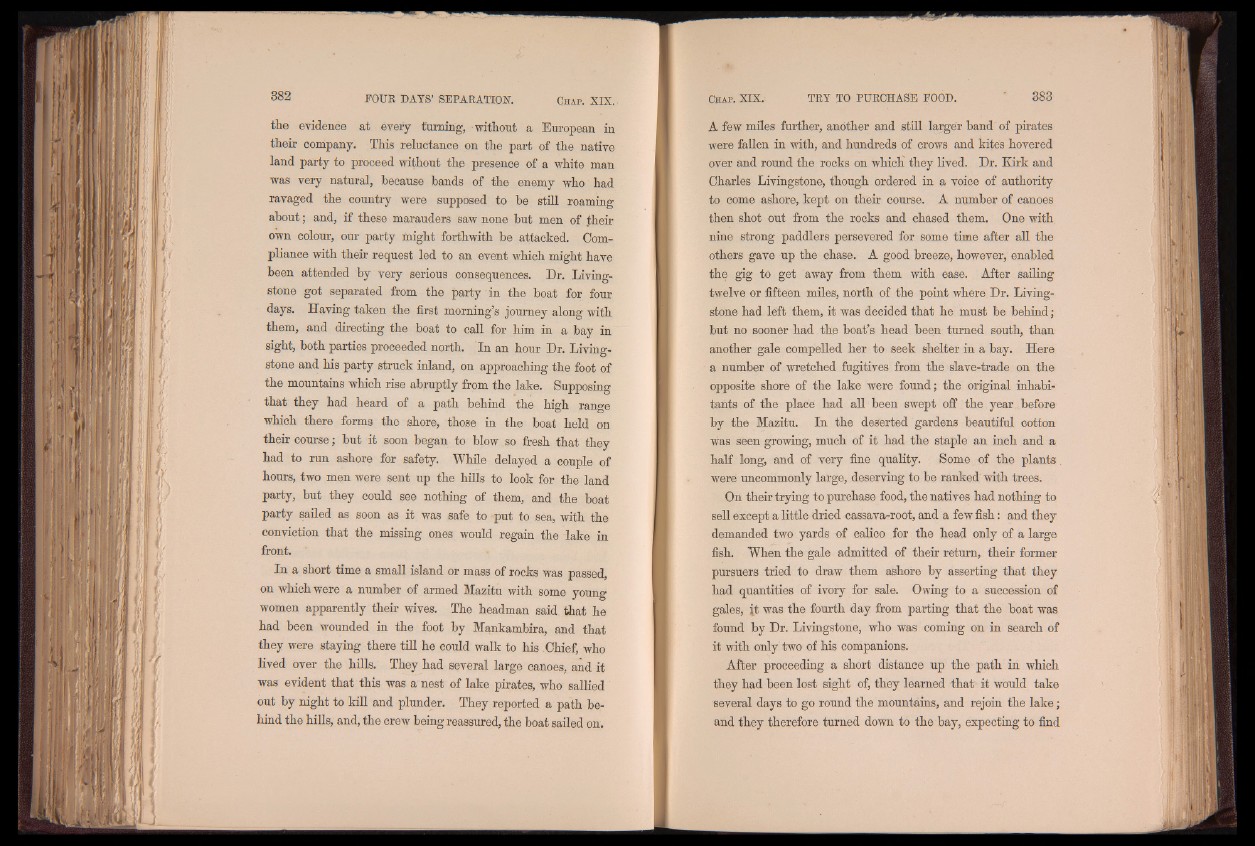
the evidence at every turning, without a European in
their company. This reluctance on the part of the native
land party to proceed without the presence of a white man
was very natural, because bands of the enemy who had
ravaged the country were supposed to be still roaming
about; and, if these marauders saw none but men of ¿heir
own colour, our party inight forthwith be attacked. Compliance
with their request led to an event which might have
been attended by very serious consequences. Dr. Livingstone
got separated from the party in the boat for four
days. Having taken the first morning’s journey along with
them, and directing the boat to call for him in a bay in
sight, both parties proceeded north. In an hour Dr. Livingstone
and his party struck inland, on approaching the foot of
the mountains which rise abruptly from the lake. Supposing
that they had heard of a path behind the high range
which there forms the shore, those in the boat held on
their course; but it soon began to blow so fresh that they
had to run ashore for safety. While delayed a couple of
hours, two men were sent up the hills to look for the land
party, but they could see nothing of them, and the boat
party sailed as soon as it was safe to put to sea, with the
conviction that the missing ones would regain the lake in
front.
In a short time a small island or mass of rocks was passed,
on which were a number of armed Mazitu with some young
women apparently their wives. The headman said that he
had been wounded in the foot by Mankambira, and that
they were staying there till he could walk to his Chief, who
lived over the hills. They had several large canoes, and it
was evident that this was a nest of lake pirates, who sallied
out by night to kill and plunder. They reported a path behind
the hills, and, the crew being reassured, the boat sailed on.
A few miles further, another and still larger band of pirates
were fallen in with, and hundreds of crows and kites hovered
over and round the rocks on which they lived. Dr. Kirk and
Charles Livingstone, though ordered in a voice of authority
to come ashore, kept on their course. A number of canoes
then shot out from the rocks and chased them. One with
nine strong paddlers persevered for some time after all the
others gave up the chase. A good breeze, however, enabled
the gig to get away from them with ease. After sailing
twelve or fifteen miles, north of the point where Dr. Livingstone
had left them, it was decided that he must be behind;
but no sooner had the boat’s head been turned south, than
another gale compelled her to seek shelter in a bay. Here
a number of wretched fugitives from the slave-trade on the
opposite shore of the lake were found; the original inhabitants
of the place had all been swept off the year before
by the Mazitu. In the deserted gardens beautiful cotton
was seen growing, much of it had the staple an inch and a
half long, and of very fine quality. Some of the plants
were uncommonly large, deserving to be ranked with trees.
On their trying to purchase food, the natives had nothing to
sell except a little dried cassava-root, and a few fish: and they
demanded two yards of calico for the head only of a large
fish. When the gale admitted of their return, their former
pursuers tried to draw them ashore by asserting that they
had quantities of ivory for sale. Owing to a succession of
gales, jt was the fourth day from parting that the boat was
found by Dr. Livingstone, who was coming on in search of
it with only two of his companions.
After proceeding a short distance up the path in which
they had been lost sight of, they learned that it would take
several days to go round the mountains, and rejoin the lake;
and they therefore turned down to the bay, expecting to find